The buzz created by cannabis consumption can be pleasant, but for some people, it can be too much. From anxiety to nausea, dehydration to panic, too much marijuana comes with negative effects for those with a low tolerance. If you’re a first-time user, stick to small doses and avoid high doses.
Did you already take too much and want to figure out how to get unhigh? Here are some quick steps to help you sober up from weed and avoid feeling anxious.
- Try A THC Detox Drink
- Take A Cold Shower
- Find Something To Focus On
- Eat Pine Nuts, Lemon Skin, Or Black Peppercorns
- Take Some CBD Oil
- Drink Plenty Of Water
- Sleep It Off
High-Not
<p>High-Not is your ultimate recovery shot to counteract a negative cannabis experience. Our natural blend gives you control and confidence, allowing you to decide when to "Ease Your High".</p>
Shop Now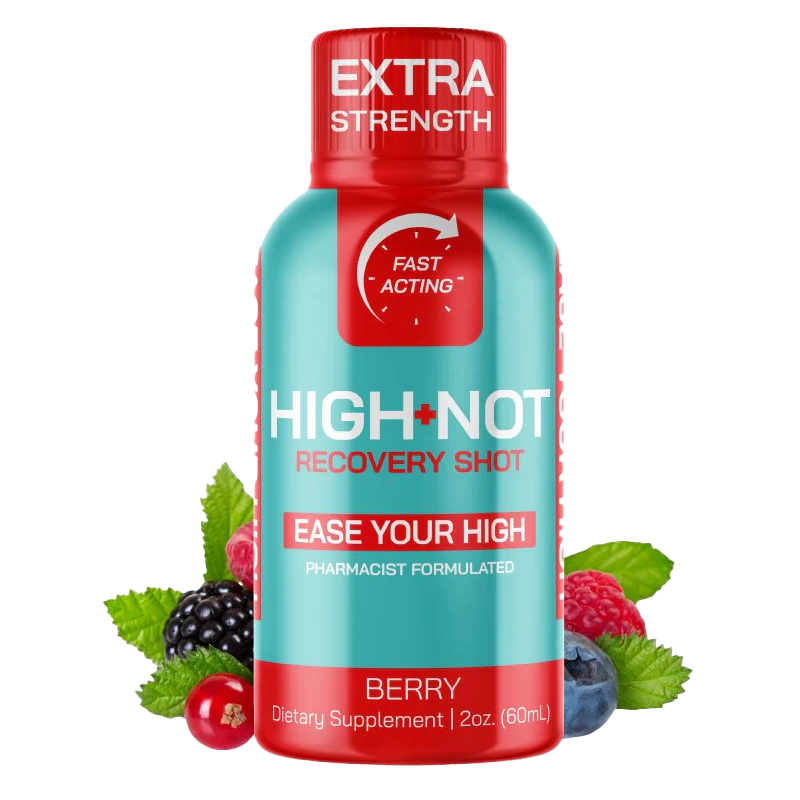
Understanding the Effects of Getting High
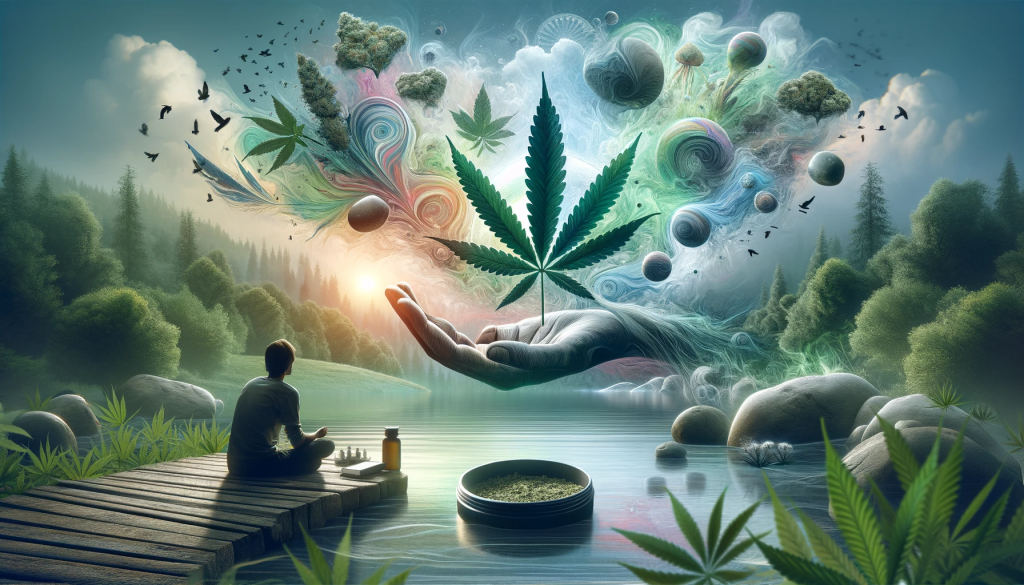
THC, the main active ingredient in marijuana, can contribute to a range of mental and physical effects, such as feeling happy or relaxed, being more talkative than usual, experiencing increased appetite (munchies), an altered sense of time perception, or even feelings of paranoia.
What Happens When A Person Smokes Marijuana?
Getting high from marijuana can produce a range of physical and psychological effects, depending on the potency and dosage consumed. Typically, people experience the following effects:
- Intoxication
- Euphoria
- Impaired Judgment
- Impaired Coordination
- Memory Loss
- Paranoia
- Poor Attention Span
The active ingredient in cannabis is tetrahydrocannabinol (THC), which stimulates specific areas of the brain, resulting in one feeling “high.” There can also be side effects such as hallucinations or an inability to carry out motor functions properly, as well as other short-term changes to cognition that may include difficulties with thinking abstractly or logically.
When Do You Start To Sober Up From Weed?
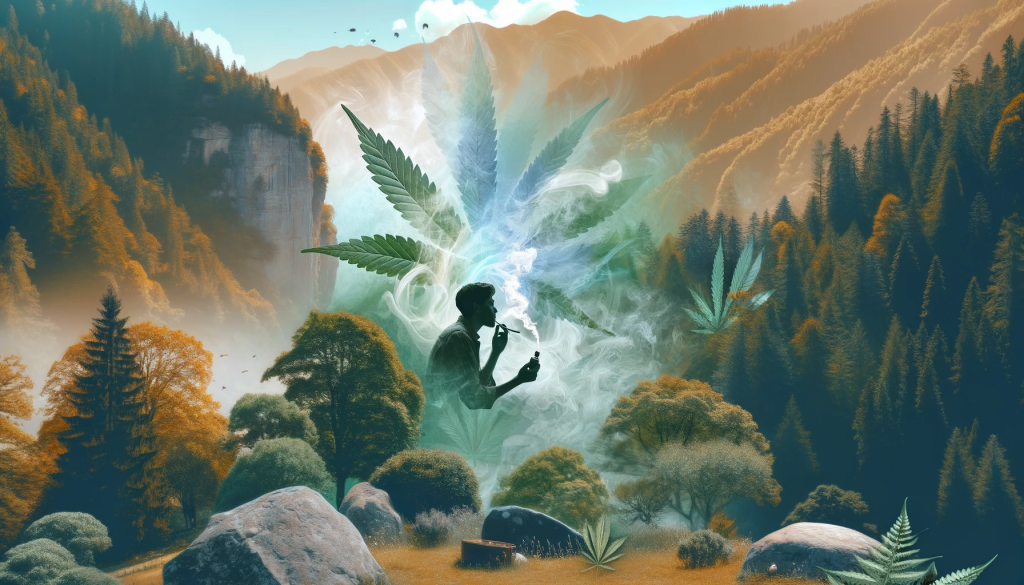
The duration of your weed high can vary depending on the method used to consume marijuana.
When smoking cannabis, a person typically feels the effects of THC within seconds, and they peak within 30 minutes to one hour. The majority of psychoactive effects typically fade in 1-3 hours, although some residual effects may linger for up to 8 hours or longer.
Consuming cannabis edibles can lead to a delayed onset of as much as two hours before the effects are felt but will last 6-8 hours or even longer, depending on factors such as potency and individual metabolism rates.
Subsequently, using stronger strains may also affect how long you stay ‘high’ because of increased levels of THC being consumed. It’s important for users who want a shorter weed high to be aware that dosing errors can have dire consequences when it comes to their experience with cannabis. It is recommended to always start low and slow with smaller doses to get more predictable results from each usage session. Certain cannabis strains might cause you to feel like you have more energy, while others might have a more sedative effect.
The Intoxicating Effects Of Too Much Cannabis
When consuming too much cannabis, there are specific signs that someone is likely to display that could indicate they are getting too high. This includes:
- Increased Heart Rate
- Nausea
- Disorientation
- Paranoia
- Panic Attacks
- Hallucinations
Other physical signs of marijuana use include red eyes, droopy eyelids, and slurred or delayed speech, while cognitive effects can be memory loss and trouble with concentration. People who consume the cannabis plant also experience “the munchies,” or the uncontrollable urge to overeat. Cannabis affects the ability to control parts of the appetite. These symptoms indicate being too high on marijuana, which can lead to adverse reactions if not managed properly.
Why It’s Important to Sober Up From Weed
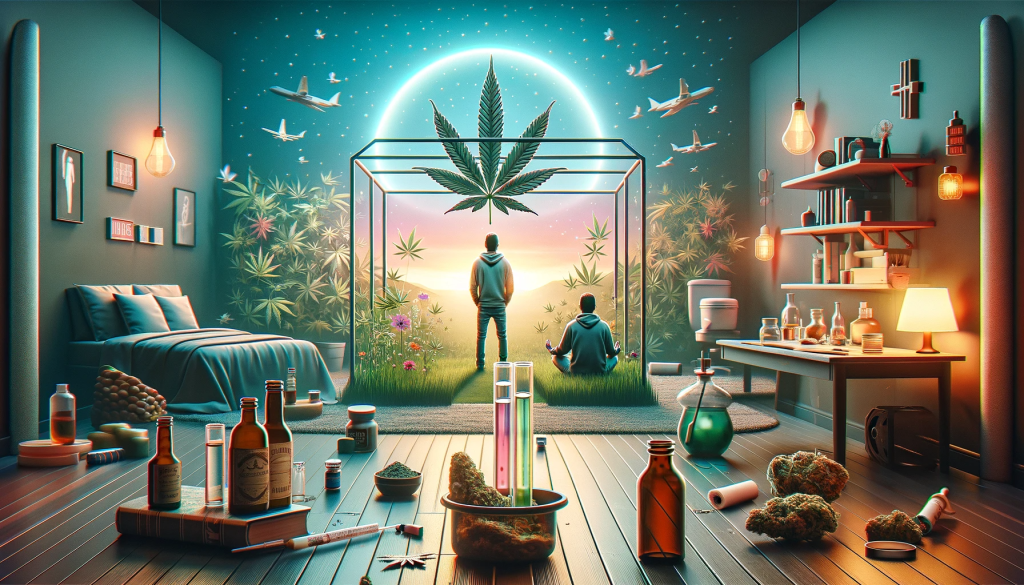
Sobriety is important for several reasons. When using any drug, including marijuana, it is essential to remain mindful and in control of one’s mind and body. Prolonged weed intoxication can lead to increased stress, anxiety, frustration, and other unwelcome side effects.
Furthermore, the process of how to get unhigh goes beyond the first few hours. For those who smoke weed or ingest edibles, THC can stay in your system for days, weeks, or even months. THC metabolizes in fat cells and sticks around, showing up on drug tests even when you haven’t been taking marijuana for some time.
How To Get Unhigh After You’re Done Smoking Cannabis
High-Not
<p>High-Not is your ultimate recovery shot to counteract a negative cannabis experience. Our natural blend gives you control and confidence, allowing you to decide when to "Ease Your High".</p>
Shop Now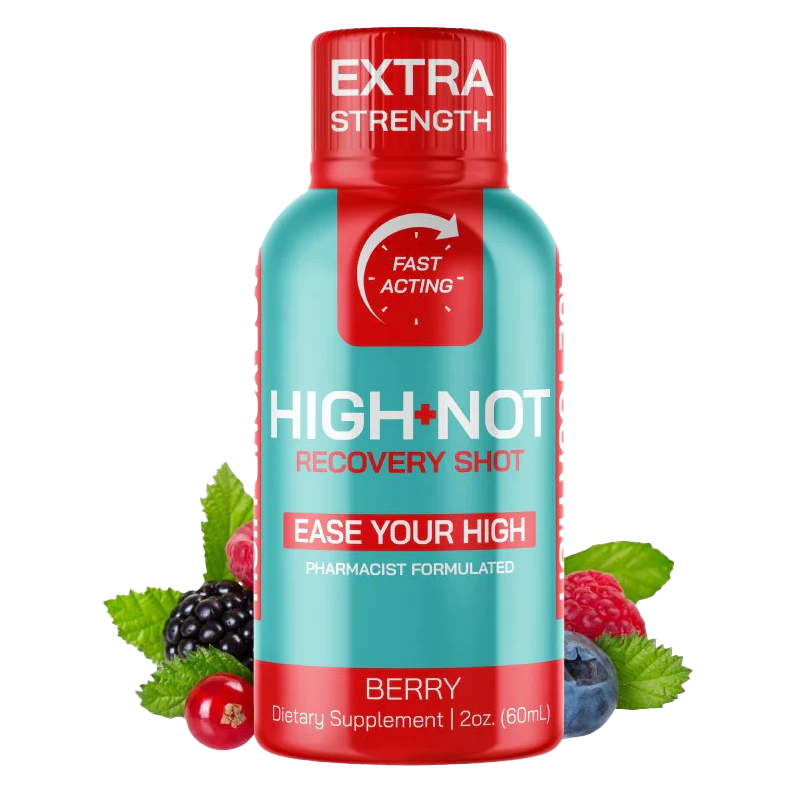
Many kinds of detox products and kits can help you flush leftover THC from your body and improve your overall wellness. Some of these types include:
- Single Detox Shots
- Detox Kits
- Full Detox Drinks
How To Stop The Psychoactive Effects Of Smoking Weed

The results of marijuana vary based on the user, but generally, if you start to feel the symptoms of too much weed, remember to take deep breaths and avoid drinking alcohol since this will make the cannabis high worse. Drink fresh water to treat dry mouth.
Watch your dose and potency
When it comes to cannabis, knowing how much you take and the potency of different products are two important factors. Taking too much or a product that is higher in THC can increase the risk of negative effects and make it harder to get unhigh.
Even though marijuana is not known for having significant lasting side effects, especially when considering products with low levels of cannabinoids, over-consumption will cause psychoactive effects, including anxiety, increased heart rate, and feeling out of control, which can last a little longer than desired; these symptoms may counterproductively increase feelings of disorientation or paranoia.
It’s important to keep track of your dose (amount taken) and the potency (percentage/review / PSI/categorization)of each type consumed as this affects duration and severity – generally speaking, higher doses have more intense effects; however, potencies also play a major role.
Thus, whenever possible, try keeping an eye on both factors if you want to remain in control while getting high – consuming small amounts until reaching an optimal level before taking another puff.
Remember that what might be suitable for someone else may not necessarily work best for you, so adjust accordingly – The same goes when trying to reduce their buzz; start by slowly reducing intake, then tweak from there if needed.
Give it time
Giving it time is an effective way to get unhigh as THC gradually wears off over time. As the body naturally metabolizes the substance, it helps reduce the intensity of being too high.
Additionally, allowing patience and avoiding impulsive actions enable a quicker come down from intoxication by allowing time for marijuana’s effects to pass from your system. This works best with low doses and mild strains, as stronger doses can take longer to wear off.
It’s also important to stay hydrated and practice relaxation techniques like drinking herbal tea or listening to calming music while waiting for your high subside naturally in order not feel overwhelmed due to its strong effects on the mind and body.
Practice relaxation techniques
Relaxation techniques are an effective way of sobering up from a high caused by weed. Deep breathing exercises, meditation, and listening to soothing music have been known to help reduce the effects of THC.
For deep breathing, you can focus on your inhalation until it slowly releases at an equal rate, which can be calming for some and offer relief from any stress or anxiety that comes with being too high.
Meditation can work the same way but involves more focused concentration and visualization techniques; spend time focusing on positive thoughts instead of negative ones to reach a calmer state of mind while meditating.
Find a distraction
Engaging in activities that demand your attention can help shift focus away from the effects of being high and reduce unpleasant feelings such as anxiety or restlessness.
Finding something enjoyable that captures one’s interest can not only provide an effective way to pass the time, but it can also be immensely calming for those seeking relief from sensory overload.
Examples may include playing music and an instrument, doing some light yoga stretches, watching TV shows or movies you enjoy, reading a book, or creating art. Being able to create and/or immerse yourself in something meaningful can significantly ease tension and induce a more relaxed state of mind—both necessary components for getting out of the proverbial “weed fog.”
Stay hydrated
Staying hydrated is a key part of sobering up from being high. THC can be detectable in the system for several days, and drinking plenty of water has been proven to reduce the intensity of the buzz caused.
It also helps flush out THC much faster than when one is dehydrated—the body needs enough fluids to process and eliminate it efficiently. In addition, dry mouth is among the most common side effects of smoking weed, so proper hydration will combat that as well.
Coconut water and sports drinks can also help replenish electrolytes lost during smoking or vaping excessively since they are specifically enriched with natural nutrients that aid in recovery.
Avoid other substances
Abstain from consuming any additional substances that could prolong or intensify the effects of being high. This includes avoiding drugs, alcohol, and caffeinated beverages such as coffee.
THC can remain in your system for up to 8 hours so introducing other intoxicating substances during this time will undoubtedly increase those effects even further. Therefore, it is best practice to stay away from any mind-altering drugs while attempting to sober up and give the THC enough time to work its way out of your body naturally without reexposure.
Additionally, some studies are highlighting an increased risk of developing panic attacks when using alcohol or cannabis together.
Have a safety plan
Having a safety plan is essential. A safety plan should include strategies that can help an individual to regain control and sober up. These strategies typically involve watching one’s dose and potency, staying calm, finding a distraction, and staying hydrated.
Watching doses helps individuals stay aware of how much they are consuming to prevent overly high intoxication levels that may be harder to come down from than anticipated.
Practicing relaxation techniques like yoga or even just taking a nap is also recommended as part of the safety plan; this helps users remain calm and clear-headed enough to find distractions such as engaging in activities with friends, playing video games, or listening to music.
Staying hydrated helps flush out excess THC in the system more quickly—cannabis users need to ensure they are well-hydrated before using marijuana so it does not become too overwhelming once the high begins setting in.
In addition, seeking support (from either professionals or reliable friends/family members) can also aid recovering users by helping them talk through their experience with someone who has been through similar situations before.
Seek professional assistance
Seeking professional assistance is a highly effective way to get unhigh, especially if the person feels too high and needs some guidance in managing their symptoms. Professional help typically includes rehabilitation, addiction counseling, therapy for substance abuse, recovery programs, and interventions to assist individuals in sobering up.
Some medical assistants may also prescribe medications that can reduce anxiety or panic attacks caused by being too high. Furthermore, it’s important for people who are struggling with getting unhigh to know that they have access to support groups as well which can help them find comfort in times of need.
There is no shame in seeking out professional assistance; it’s often just what someone needs if they cannot manage the effects of THC on their own.
Use THC detoxes
THC detoxes are products specifically designed to reduce or eliminate the psychoactive effects of THC. These products usually contain natural ingredients such as fiber, amino acids, vitamins, minerals and herbs that help flush out THC from the system more quickly than through a natural process alone.
While using these types of detoxes is not always necessary to sober up after getting high, it can be beneficial for those who need results more quickly or need relief due to an uncomfortable sensation caused by being high.
When taking a THC detox, users should pay attention to the dosing instructions provided with each product, as they tend to vary between brands and formulations. It’s important for individuals using them do so responsibly and only take when necessary as there may be side-effects associated with certain types of detoxes like dehydration and stomach discomfort depending on their composition.
Final Thoughts
When it comes to getting unhigh from marijuana, patience is key. Although various techniques may offer relief, the effects of cannabis can take time to wear off so giving it some time and waiting it out is often the only guaranteed way for someone to get sober again.
Additionally, people should ensure they practice self-care when trying to get unhigh. Drinking plenty of water throughout their experience is essential in reducing the intensity and duration of the high while carful consideration of dosages can help prevent any overwhelming experiences.
Finally, if someone feels too high or uncomfortable with their state, seeking professional assistance or applying detoxes could potentially bring better results than other tactics used alone would achieve.






